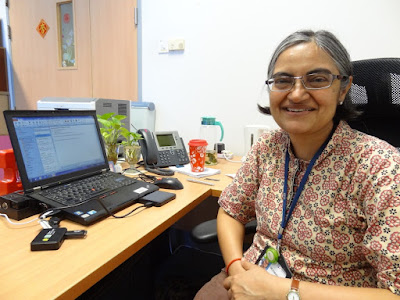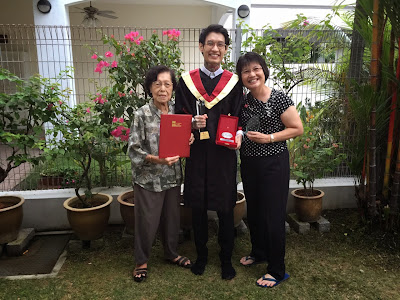Dr Subadhra Devi Rai � An Exemplary Lecturer and Advocate
On 16 February 2015, Dr Subadhra Devi Rai received news that she won the 2015 International Achievement Award by the International Council of Nurses� (ICN) Florence Nightingale International Foundation (FNIF). She is the first Singaporean to receive this prestigious award.
Since 1999, this award has been given every two years to a nurse practitioner who has at least 10 years of experience in Direct Care, Education, Management or Research. For Dr Subadhra, her career has focused on reintegrating refugees at the Thai Myanmar border, gender-based violence and sexual health.
Come 21st June 2015, she will be receiving her award at a special FNIF Luncheon held at the ICN Conference in Seoul, Korea, and join in the ranks of other past winners including Sweden�s Anneli Erikkson, who worked with endangered communities which suffered from catastrophes and USA�s Carol Etherington, who worked on community based programmes for people living in the aftermath of war and natural disasters.
I had the opportunity to catch up with her in the midst of her extremely busy schedule, and these are her thoughts on her nursing journey for the past 30 years.
What made you choose Nursing? Tell us more about your Nursing journey prior to teaching in NYP
I think it suited my nature. I like caring for individuals and nursing somehow intrigued me. But applying to nursing school was another story. I didn�t know about the application deadline for the School of Nursing at Singapore General Hospital (SGH) back in 1982 and I only had a few hours before the application closed. I was very fortunate that my father helped me out.
My family didn�t influence me to study nursing. I think what my parents have always taught me is to always do my best in whatever I choose. I was inculcated with the values of respect and honesty, and taught to value education. And Nursing allows me to pursue all these.
In the beginning, like many people, I had no idea what nursing was all about. But once I started training, I realised it is a combination of three factors - science, the art of interacting with people, and being able to talk to people from all walks of life.
After my graduation from SGH�s School of Nursing on May 3rd 1985, I worked at National University Hospital (NUH) for 3 years before I left for further studies in Canada. I pursued two bachelor�s degrees in Nursing and Anthropology at the University of Victoria. Unlike today where young people who have decided to join the profession have greater opportunities to further their studies, in my time, the opportunities were very limited. So I went to Canada for 2 reasons - to do further training and to see the world. I wanted to see what was outside Singapore and I think I made a good decision. It made me a better person. I�m not so narrow minded in my thinking and I know there are other ways of solving a problem. So it was a good adventure for me.
What is one life changing experience you have experienced as a Nurse?
One notable experience was during my younger nursing days where I was shown the indomitable spirit of humankind. That was what I saw in a young woman who was diagnosed with myasthenia gravis, a chronic autoimmune neuromuscular disease. She was completely paralysed to the extent that she had to be on a ventilator.
But I saw her eventually walk out from the Intensive Care Unit, not being ventilated and able to breathe normally. I saw that gumption in her, that spirit which is remarkable and amazing. I was amazed at how our body is so resilient. To me, it is one of the best lessons that I�ve learned and have experienced.
What are some of the most valuable lessons you have learned at as nurse?
To be open to various experiences, and not to make assumptions of anyone. Nursing has allowed me to go places and meet with various people. The profession itself has also taught me to be compassionate and kind to others because what we see at the present moment in a patient may not be the true reflection of the patient in reality.
If you could talk to your younger self and perhaps change something then, what would it be and why?
I remember when I was 18 years old, I wanted to own a pineapple farm because I loved pineapples. The idea of having a pineapple farm was actually to have a non-profit social enterprise and to have the people who are working for me being owners and shareholders. I wanted to enable people to run a business that�s culturally and traditionally based.
If you go to other countries, they have the arts, culture, artefacts that will tell you that this piece is from China or India and so on. In Singapore, sadly we are not on par with them due to the lack of nurturing our own culture.
I�ve been thinking of that idea again and again, so it�s something for me to follow up on.
What is the secret to being a great nurse?
Honestly, there�s no secret. I always tell my students that if you want to be a mediocre nurse, you can just do the basics. But you if want to be an exceptional nurse, you have to go out of your way and do more than the basics. You have to be championing and advocating for your patients. It�s about going the extra mile. You have to show that you�re caring and compassionate. Caring for someone with a heart is what I think lies in the art of being an exceptional nurse.
You have been a lecturer in NYP for four years. Could you share with us your personal highs and lows?
I personally find it gratifying when I find students who are willing to look at things multi dimensionally. That makes me feel excited because it tells me that this person is willing to learn to look at a different perspective.
The painful part of being a lecturer is when I find students who are disinterested. I don�t mean uninterested, but disinterested, for example, students groaning over the work that they have to do. They are not in school because they want to be there. Rather, they feel that this is the only option they have. Even if you don�t want to be to be there, you need to give your best in what you do. That to me is one of the most difficult things to cope with.
I don�t mean to generalise all young people, but I also observed a change, a shift in attitudes and behaviour. I do have students who feel like it�s their entitlement, to have me update their attendance when they are late. But when they ask me, they don�t say �thank you� or �please�. Of course there are students who are the exception and practise basic courtesy. When I see these students, it comes to me as a surprise rather than the norm.
I know a lot of people have been congratulating you over your win. What was your initial reaction when you first heard the news?
I actually found out about it when I was reading my email. I received an email from ICN and then I forwarded the email to my nursing director. I knew she had nominated me for the award. She wrote a letter about me (from the CV I gave her) and sent it to the Singapore Nurses Association and it was forwarded to the ICN.
My initial reaction was �Is this for real?� I didn�t disclose it to anyone. I remember that I sat down, kept quiet for a while and waited for the news to sink in. I re-read the email to ensure that it wasn�t a mistake. I was really surprised because there were many other deserving candidates and I am truly grateful for this incredible honour.
What made you want to focus on gender-based violence, sexual health and reintegration of refugees in your line of work?
My PhD was actually on women�s health and I went to India to do my field work. So I looked at women�s health from the perspective of the indigenous midwifes. I was very interested in any form of women�s work. For example, a housewife who is taking care of her own family is not paid. Whereas a woman who does the same work in someone else�s home by taking care of their family is being paid. So I was discovering and comparing why, in one context, when one woman has no monetary value whereas another woman who does the same job has monetary value.
Likewise, in India, there were bio-medically trained midwives who are paid and their work is recognised. However, indigenous midwives who have learned the art of birthing from their family are not recognised or valued. My interest also led me to becoming the health coordinator at Women's Education for Advancement and Empowerment (WEAVE), which is a non-government organisation based in Changmai, Thailand.
I was also interested in the health of people who are displaced. For example, the Rohingyas are displaced people as they are not recognised as Myanmar citizens. When I say health, it�s not just physical health. It�s also holistic health. So working for WEAVE was very exciting for me because I was able to look at women�s health from different aspects.
I�m also interested in other areas such as capacity building, advocacy issues, and education.
Were you personally inspired by any of the past award winners like Anneli Erikkson and Carol Etherington?
You know this award is a completely new thing for me. I didn�t know that there was such an award nor did I know about the past winners and their work. But of course each of these winners will be an inspiration for all of us because it tells us that our roles as nurses are beyond boundaries. We can contribute in many ways. It doesn�t have to be always in the hospital or prescribed by someone else. Of course, I do hope I can meet them in person during the conference.
If you could dedicate this award to anyone, who will you dedicate it to and why?
My parents, because they have instilled good values in me. They have taught me what it means to be a good person.. I am who I am because of them.
What do you see yourself doing in the future?
I would like to own a pineapple farm for sure. I would like to be an entrepreneur. That�s my dream. You don�t have to be young to be an entrepreneur. To learn is a constant thing. It doesn�t end in school and it can happen anytime. Our daily lives are part of our learning.
I like to be an advocate for people who are unable to advocate for themselves.
For me, getting an education, an opportunity to go to school, the opportunity to meet different people and go to different parts of the world, does open up my perspective of the world. I think it�s a privilege to be able to do that.
I also enjoy being a researcher. But my main goal, apart from being a lecturer is to be an exemplary person.
What is your advice for new and current nursing students?
I think some of my students would know my core values. Some of the advice I would give them is to care from the heart. It sounds really airy fairy. But that�s something that nurses or physicians these days don�t show very much. When a sick person is admitted to hospital, you don�t have to be clinical minded. You need to show that there are other things that you can do for the person or his family. But importantly, show the patient that we see him/her as person and not a disease. Treat each one of them, as part of your family, or your friend.
Be honest, have integrity and to be ethical. All these qualities are connected to the word �caring�.
What is your perspective of technology in clinical care?
It�s supposed to help us in our work, but we end up being enslaved to it. Technology has been used to replace many things and yet it does not have a human touch. At the end of the day, when the patient is lying on the bed, they don�t really care about the medication you give them. What they want you to tell them is �I care and worry about you�. That is what people are looking for. If the smartest nurse isn�t showing care and concern to the patient, the patient will not feel well. Because the patient will think that he or she is just a disease.
You can observe how often nurses call their patients by name when they do their handover reports. Most of the time, they will say �Patient in bed 25, patient in bed 24� and so on. We don�t even bother knowing each patient�s name. None of us want to be called by numbers. It also tells the person that you don�t bother. I think many of us who have unknowingly been enslaved and enamoured by technology have forgotten what it is like to be a human being. Technology is just an instrument to help us to do our work, but it shouldn�t tell us how to do our work.
What is your perspective of nursing?
When you ask people what is nursing, their reply will probably be �It�s a dirty job�. Is it really a dirty job? I don�t think so. Just think of this. If we are bedridden, how many of us will allow someone else, a complete stranger to touch and clean the intimate parts of our body? Of course you will have to allow someone to help you. To me that�s dignified work. It comes with no words. But we don�t see it as a dignity and a privilege and are more accustomed to seeing it as �dirty work�. Why can�t we see as meaningful work, a dignified work for someone else?
What is the one food you can live without?
I love yoghurt. Not those purchased yoghurts from the supermarket. I make my own yoghurt and top it up with lots of fruits.
If you can have a favourite hangout around NYP, where will it be and why?
The fountains at the level 2 gardens, because I love the sound of water. That�s why I have a mini fountain on my office table because it helps me to relax. The greenery around NYP also gives me a secure feeling.
What is the one interesting thing that people don�t know about you?
I�m actually a funny, friendly person beneath my stern, strict look. It�s just that I don�t show it often.
By David Lau, Year 1, Diploma in Nursing
Currently pursuing his Diploma in Nursing, David is one of the newest members in The Write Stuff (a CCA for writers and social media enthusiasts). Being experimental and explorative, he believes that it is ok for experiments to fail because it toughens him up. When faced with failure, David believes in taking it with a pinch of salt and getting up again.
He is an artsy person, and loves musicals as well as photography. It�s best to meet him and talk to him in person to find out what he is really like.





Comments
Post a Comment